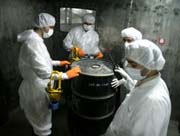Russia joins U.S., Germany, France, Britain in criticizing Iran over uranium enrichment claim
Russia joined Britain, Germany, France and the United States on Wednesday in criticizing Iran after its president said Tehran had successfully enriched uranium for the first time, a potential step toward developing nuclear weapons, reports said.

"We believe that this step is wrong. It runs counter to decisions of the IAEA (the U.N. nuclear watchdog) and resolutions of the U.N. Security Council," Russian Foreign Ministry spokesman Mikhail Kamynin was quoted as saying by the ITAR-Tass news agency.
He said Russia, which has close ties with Tehran, had learned "with concern" of the Iranian announcement. But the foreign minister cautioned against dramatizing the situation.
British Foreign Secretary Jack Straw said Wednesday he was "seriously concerned" by the Iranian president's assertion.
"I call upon Iran to suspend its activities, begin the process of building confidence and get back into negotiations," he said in London. "We will remain in close contact with our international partners, whose strong reactions show the depth of international concern there is about Iran's activities."
In Berlin, Chancellor Angela Merkel's government also said Iran's announcement was cause for concern. "It is another step in the wrong direction by Iran," German government spokesman Thomas Steg said.
French government officials called the move worrying. "We are in the process of diplomatic regulation of this affair. We call on Iran to respect its obligations" and stop nuclear activities, French government spokesman Jean-Francois Cope said.
Russian Foreign Minister Sergey Lavrov reiterated Moscow's firm opposition to any military action against Iran.
"I wouldn't rush into any hasty conclusions, as tensions are raised too often around Iran's nuclear program," said Lavrov, who also said it would be wrong to "whip up passions, because Iran has never announced that it strives to have nuclear weapons."
Commenting on reports of U.S. plans for a possible military attack on Iran, Lavrov added: "If such plans exist, and we have, of course, read about them in the media, they will not be able to resolve the problem," he said. "They will only create another hotbed of tension in the Middle East, a region which already has enough such hotbeds."
Stephen G. Rademaker, acting assistant U.S. secretary of state for arms control, called the Iranian announcement "deeply disappointing" but reaffirmed Washington's continuing commitment to diplomacy.
Another Russian Foreign Ministry spokesman, Andrei Krivtsov, said Moscow hopes a visit due to start Wednesday by the chief of the Vienna-based International Atomic Energy Agency may help resolve the standoff.
The timing of the Iranian announcement suggested Tehran wanted to present ElBaradei with a fait accompli and argue that it cannot be expected to entirely give up a program showing progress.
The U.N. Security Council has demanded that Iran stop all enrichment by April 28 because of suspicions the program, which Tehran maintains is peaceful, is designed to make nuclear weapons, reports AP.
O.Ch.
Subscribe to Pravda.Ru Telegram channel, Facebook, RSS!


